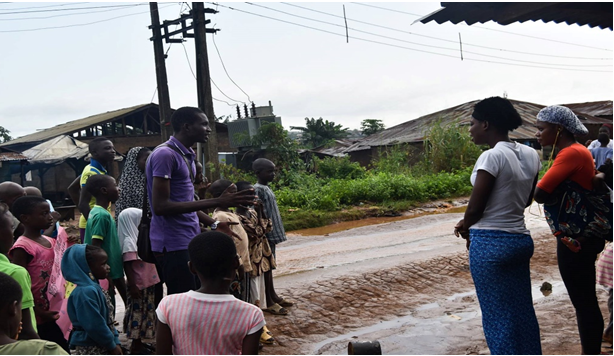INTRODUCTION
APRIL 6, 2018, marks a significant turning point in the history of education in Nigeria, particularly in Ondo state. This is because the first set of students who have acquired a novel and unique kind of education known as ‘green education’, graduated on that day. The convocation ceremony took place inside the beautiful hall of the Green Institute which shares the same facility with Homaj Secondary School, Ondo-Akure Road, Itanla, Ondo State, Nigeria.
The graduating students, each of whom was awarded a nano degree in Early Childhood Education Sustainability, are Elizabeth Adeyemo and Temilade Adegbite. It was a fascinating story of innovation, intellectual creativity, entrepreneurship and career sustainability.
DISTINGUISHED GUESTS AT THE OCCASION
The special guest was Dr. Oyinloye from Adeyemi College of Education, Ondo. The other prominent guests included Mr. T.J. Falowo (Wesley University, Ondo), Mr. Charles Adeyemi (Elizade University), Ms. Akinseye (Adeyemi College of Education) and Ms. Fabunmi (Federal University of Technology, Akure).
The other guests in the audience were students from tertiary institutions, professionals, parents and guardians and well-wishers of the graduating students.
COMMENCEMENT OF THE CEREMONY
The convocation ceremony began at about 11:30 am with the showing of two fascinating TED talks on ‘The importance of Relationship in Educating Children’ and ‘What Makes a Good Teacher Great?’ respectively. Each of video clips ran for about 15 minutes. The amiable and ever-smiling anchorperson for the ceremony, Miss Odunayo Aliu of The Green Institute prompted the attentive audience to either ask questions or pass comments on the TED Talks. This opened a barrage of elevating critical comments especially from the guests on the high table, led by Dr. Afolabi. He opined that most of the solutions proffered by the TED speakers might not be applicable to the Nigerian situation because of some peculiar hindrances. By and large, everybody finally agreed that sound ‘relationship’ between a teacher and the students he/she teaches is a necessity for the achievement of learning objectives in schools.
After that, Miss Odunayo called on the special guest of the day in the person of Dr. Afolabi (aka ‘Baba Bimbo’) to deliver the keynote address. He was greeted by the whole house with thunderous applause, apparently because he is a respected and popular teacher and academic who is loved by his students especially those in ACE. He presented a paper on “Early Childhood Education for Sustainability”. It was very educative and expertly presented.
THE HIGH POINT OF THE EVENT
The high point of the day was the presentation of their research project by the graduating students. Thus, Miss Elizabeth Adeyemo was called, and she came up and did her presentation on ‘Teaching Children with Learning Disabilities for Sustainable Development‘. It was fantastic, and she got general applause for it. Then came the turn of Miss Temilade Adegbite whose research work was on ‘Early Childhood Education Curriculum into Prenatal Care Program: A Suggestive Approach‘. She presented it confidently and got the commendation of all.
Of course, as the students were doing the presentations, they were being assessed by a team of distinguished academics who were also on the high table for the purpose. Their assessments would form a part of the final grade of the graduating students. However, after the students finished presenting their research works, the anchor person requested the guests, especially those on the high table, to pass their comments on the performances.
Subsequently, Dr. Afolabi praised the graduating students for their elegance, confidence and determination. He pointed out areas that the students should improve on in their skills and presentations. He also commended the Founder and Director of The Green Institute, Adenike Akinsemolu, for a job well done on the students and prayed that God should give her more power and grace to fulfil the mission of the Institute
Also, Madam Oloyede, the representative of Dr Oyinloye, similarly commended both the founder and the students for their efforts. Other invited dignitaries and members of the audience too did the same.
CLOSING REMARKS
The Founder and Director of The Green Institute, Adenike Akinsemolu, was called to the podium to give her speech. The speech was short and direct. She briefly pointed out that it was hard to start and continue such a novel idea as The Green Institute in such a challenging environment but that because of her focus, determination and committed Team, the dream is finally a reality. She promised that more was still to come. She finally thanked everybody for honouring the invitation to grace the occasion, particularly the special guest and all distinguished guests on the high table.
PHOTOGRAPHY
Finally, it was time for taking pictures. It started with group photograph of distinguished guests and the graduates of the day.
CONCLUSION
With what the first convoked students of The Green Institute, Ondo, displayed on the day of their convocation, and with the kind of comments passed on them and the institute by eminent scholars and academics who witnessed the occasion, I am confident that the institute has started charting a new and availing path for the proper education and equipment of students and the youth for sustainable personal, social and economic development in Nigeria.
TUNDE TIJANI
(B. Ed & M.A English)













































































































































